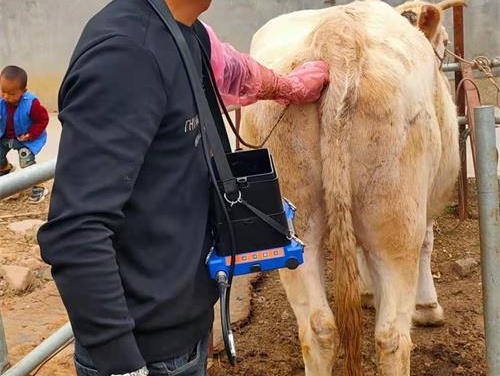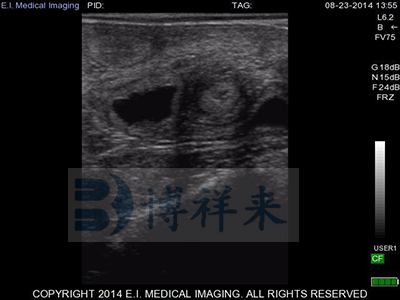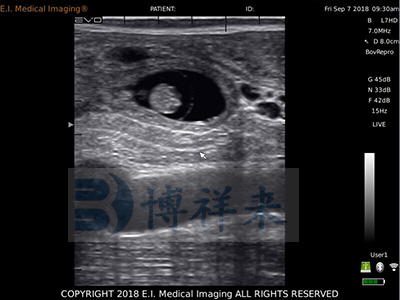Early pregnancy detection in cattle is a pivotal aspect of reproductive management, directly influencing herd productivity and economic returns. Among the available diagnostic methods, transrectal ultrasonography stands out for its ability to identify pregnancies at an earlier stage compared to traditional techniques.

Understanding the Earliest Detection Window
Transrectal ultrasonography enables the detection of pregnancy in cattle as early as 25 spre 28 zile post-reproducere. This early detection is facilitated by visualizing embryonic structures such as the embryonic vesicle and heartbeat. Însă, while detection is possible at this stage, accuracy improves significantly after 30 Zile, making it a more reliable benchmark for early pregnancy diagnosis .

Ultrasound image showing a 28-day-old bovine embryo
Advantages of Early Ultrasound Detection
-
Timely Rebreeding Decisions: Identifying non-pregnant cows early allows for prompt rebreeding, reducing the interval between calving and conception.
-
Assessment of Fetal Viability: Detection of the fetal heartbeat, typically visible around 21 days post-conception, provides insights into embryo viability .
-
Detection of Multiple Pregnancies: Ultrasound facilitates the identification of twin pregnancies, enabling tailored management strategies to mitigate associated risks .
-
Fetal Sex Determination: Between 55 spre 80 days of gestation, ultrasound can accurately determine fetal sex, aiding in herd management and marketing decisions .
Considerations and Limitations
While early ultrasound detection offers numerous benefits, certain factors must be considered:
-
Technical Expertise: Accurate early detection requires skilled technicians, as interpreting ultrasonographic images at early gestation stages can be challenging.
-
Equipment Quality: High-resolution ultrasound machines enhance image clarity, improving diagnostic accuracy.
-
Stress Management: Handling cattle during early pregnancy must be done carefully to minimize stress, which can adversely affect embryo survival .

Ultrasound image showing a 39-day-old bovine embryo
Comparative Overview of Pregnancy Detection Methods
| Method | Earliest Detection (Days) | Key Advantages | Considerations |
|---|---|---|---|
| Ultrasound | 25-28 | Early detection, fetal viability, sexing, twins | Requires equipment and trained personnel |
| Transrectal Palpation | 35-50 | Cost-effective, immediate results | Less informative in early gestation |
| Blood Tests | 28-30 | Non-invasive, suitable for remote areas | Delayed results due to lab processing |
Concluzie
Transrectal ultrasonography is a valuable tool for early pregnancy detection in cattle, offering insights into fetal development and enabling informed management decisions. While it requires investment in equipment and training, the benefits in terms of reproductive efficiency and economic returns are substantial.
References
-
Alabama Cooperative Extension System. “Beef Cow Pregnancy Examination.” https://www.aces.edu/blog/topics/beef/beef-cow-pregnancy-examination/
-
Panhandle Research, Extension and Education Center. “Pregnancy diagnosis in heifers and cows provides management options.” https://preec.unl.edu/pregnancy-diagnosis-heifers-and-cows-provides-management-options
-
BeefResearch.ca. “Pregnancy Detection.” https://www.beefresearch.ca/topics/pregnancy-detection/
-
Ceva Animal Health. “Using Cattle Ultrasound to Optimize Dairy Reproduction.” https://ruminants.ceva.pro/cattle-ultrasound